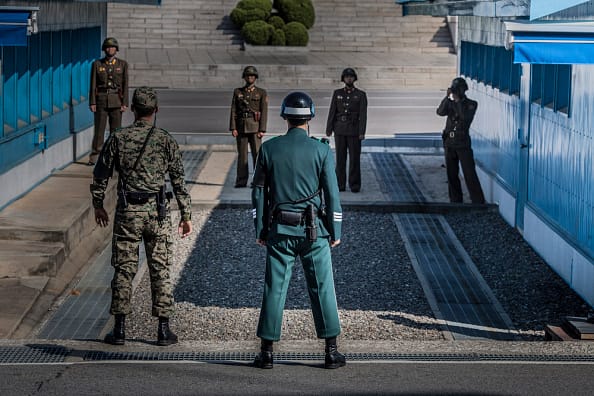21.04.2024
North Korea/South Korea: Regional Tensions, Geopolitical Differences
Interview
11 mars 2024

The way the conflicts in Ukraine and Gaza have been viewed reflects the diametrically opposed positions of North and South Korea on the international stage, and adds to the uncertainty surrounding an already fragile relationship. How can we analyse the relationship between the two states on the Korean peninsula? How does the geopolitical context crystallise their differences? An interview with Barthélémy Courmont, Senior Research Fellow in charge of the Asia-Pacific Programme and co-head of development at IRIS.
How would you characterise relations between North and South Korea since the election of South Korean President Yoon Suk-yeol in March 2022?
The relationship is bad, and reminds us of the tensions already seen on several occasions, notably under the conservative presidencies of Lee Myung-bak (2007-2012) and Park Geun-ye (2012-2017). The term of office of the liberal Moon Jae-In (2017-2022) was marked by a very significant warming in relations between Seoul and Pyongyang, particularly in 2018, with several meetings and the establishment of a hotline to prevent an accidental conflict. But tensions have gradually resurfaced, and the Covid-19 crisis, followed by the arrival in power of Joe Biden in the United States, had a negative impact on inter-Korean dialogue. With the arrival in power of Yoon Suk-yeol, who will be in office until 2027, tensions once again reached a peak, and even led to confrontations, as well as verbal escalation and the breaking off of the direct line of communication. Of course, the two countries, which are officially at war (the Korean War only ended with an armistice in 1953, but no peace treaty was ever signed), are accustomed to such periods of tension, but the international context adding to this delicate relationship should alert us to the risks of escalation.
Between the war in Ukraine and the war in Gaza, how are the two Koreas positioning themselves on the international stage?
On Gaza, South Korea’s position is similar to that of Western countries: unreserved condemnation of the attack on 7 October, but concern about a conflict that is dragging on. In the case of North Korea, the position is very simple, and contrary to what is often announced, this country is here, as on other subjects, very predictable: since 1988, Pyongyang has recognised the Palestinian authority over the whole of Israeli territory, with the exception of the Golan Heights which belongs to Syria. In other words, North Korea does not recognise the State of Israel, and relations between the two countries are particularly bad. Two radically opposed positions.
The war in Ukraine is even more tense and, in many respects, is generating new tensions between the two countries. South Korea is one of the few Asian countries to sanction Russia in addition to condemning the invasion. Yoon Suk-yeol even ventured to mention military support for Kiev, before receiving a threatening message from Moscow if he went down that road. But South Korea has strengthened its ties with Poland, which buys arms from it. As for North Korea, not only was it one of the few countries to officially support the Russian offensive at the UN, but since the meeting between Vladimir Putin and Kim Jong-un, the two countries have even become strategic allies, with Pyongyang supplying Moscow with munitions in exchange, apparently, for cooperation in the space sector. While the war in Ukraine has had very little impact on Asia as a whole, it has had a very strong impact on tensions on the Korean peninsula.
While Joe Biden insists on developing a partnership with South Korea and Donald Trump initiated a historic dialogue with North Korea during his presidency, could the American election of 2024 upset the geopolitical balance and the future of the Korean peninsula?
The United States is currently urging South Korea to join a triangular partnership that includes Japan, along the lines of AUKUS in the South Pacific. Added to this is a series of joint military exercises demonstrating Washington’s determination to strengthen its strategic partnerships in the region. Should Donald Trump return to the White House next January, it is possible that such developments will be swept aside at a stroke, as the Republican candidate has shown little attachment to strategic alliances. On the South Korean side, we are following the American election closely, aware that the inconsistency of the United States is a serious handicap when dealing with Pyongyang. But we are also following political developments in Japan, with the possibility of the departure of the current Prime Minister Kishida, and the possibility that after the presidency of Yoon Suk-yeol, his successor will question his policy towards North Korea. In short, it is clear that while Pyongyang’s strategies are fairly clear, with the regime’s survival as its sole motivation, they are open to different interpretations on the South Korean side.
Translated by Deepl.